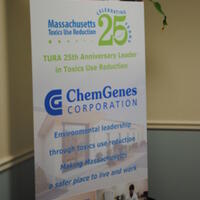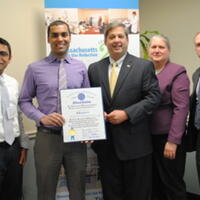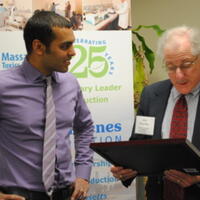ChemGenes Recognized for Environmental Leadership
Contact: Karen Angelo at 978-430-6303, [email protected].
April 28, 2015, Wilmington, Mass. – The Toxics Use Reduction Act (TURA) program and state legislators today presented ChemGenes Corporation in Wilmington with an award in recognition of the company’s environmental leadership.
One of nine companies across Massachusetts being recognized as a “TURA 25th Anniversary Leader,” ChemGenes Corporation has invested in new technologies to reduce toxic chemical use that has led to improved worker safety and financial savings.
To make improvements, Chief Operating Officer Anuj Mohan works with his Toxics Use Reduction Planner Neil Inglis of Goldman Environmental, the state’s Office of Technical Assistance (OTA) and the Toxics Use Reduction Institute (TURI) at UMass Lowell.
Mohan says: “Toxics Use Reduction is a tool that we use continuously in our facility because we’ve found that the benefits are extensive – we are protecting worker health and the environment, improving efficiencies and saving money. Receiving the TURA 25th Leadership award validates our work and for that, we are very appreciative.”
ChemGenes has reduced the use of chloroform by more than 55 percent and hexane by more than 35 percent. These reductions combined with an investment in a new chromatography system improved the efficiency of the manufacturing process and saved $215,000 in chemical purchases, regulatory fees and disposal costs. ChemGenes also reduced solid waste by 70 to 80 percent, from generating 25,000 pounds per year to only 8,000 pounds per year over three years. With the help of a grant from TURI at UMass Lowell, ChemGenes purchased a new solvent recovery and recycling system that is expected to reduce the use of hexane and ethyl acetate by 27,000 pounds, or 70 percent annually.
“Since we started working with OTA in 2005 and analyzing their recommendations to use solvents more efficiently, we’ve experienced benefits beyond what we had predicted,” says Mohan. “For example, after we reduced the use of chloroform, the cost of the chemical skyrocketed. We were ahead of the curve in saving thousands of dollars per year.”
An employer of 25 people, ChemGenes supplies products related to DNA- and RNA-synthesis for the biotechnology industry.
“ChemGenes is a great example of how small companies can innovate to reduce toxic chemical use while significantly cutting costs,” says John Raschko, OTA Team Leader. “By providing technical assistance and grants, OTA and TURI support the company’s growth in an extremely competitive global market.”
The awards and facility tours taking place from March through May showcase environmental accomplishments—reducing the use of toxic chemicals, reducing waste and conserving energy and water—since the Toxics Use Reduction Act was enacted into law by the Massachusetts legislature in 1989.
About the Toxics Use Reduction Act Program
The Toxics Use Reduction Act does not restrict chemical use but requires companies to evaluate toxic chemical use, submit usage reports to the state and assess the implications of reducing use by making process changes or switching to safer alternatives. Data show that Massachusetts companies continue to make progress in reducing toxic chemical use and waste: between 2000 and 2012, companies reduced use by 23 percent, waste by 42 percent and on-site releases by 73 percent.
Celebrating 25 Years
Twenty-five years ago, the Massachusetts legislature passed landmark legislation—the Toxics Use Reduction Act (TURA). Today, the TURA Program is considered a model environmental policy by other states and countries. The three agencies below have provided training, grants, technical assistance and support to help companies reduce toxic chemical use and costs, improve health and safety and compete globally as more international regulations restrict the use of toxic substances.
- Toxics Use Reduction Institute (TURI) at the University of Massachusetts Lowell. Provides education, training, and grants for Massachusetts industry and communities; sponsors research and demonstration sites on safer materials and technologies; provides policy analysis; and manages the TURA Science Advisory Board.
- Office of Technical Assistance & Technology (OTA). A non-regulatory agency within the Executive Office of Energy and Environmental Affairs that provides free, confidential, on-site technical and compliance consultations to Massachusetts businesses and institutions.
- Massachusetts Department of Environmental Protection (MassDEP). Certifies Toxics Use Reduction (TUR) Planners, receives and reviews toxics use reports submitted by companies, provides guidance, takes enforcement actions, and collects chemical use data and makes it available to the public.




